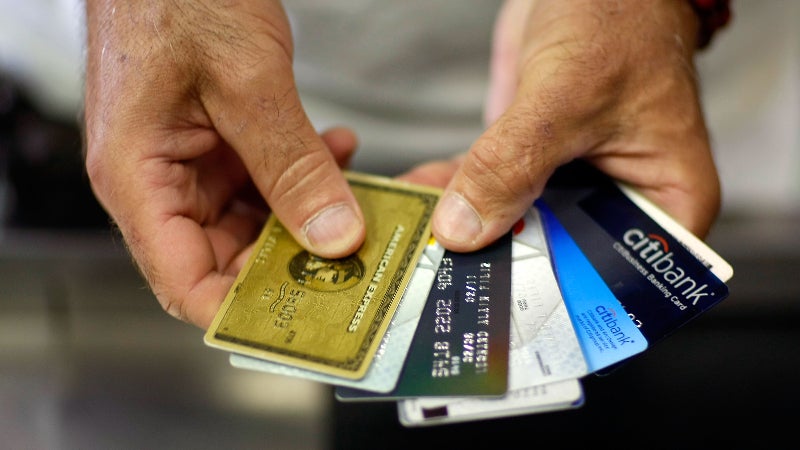How to switch credit cards with your issuer

Key takeaways
- If there comes a point when your credit card doesn’t align with your spending patterns and lifestyle, you may be better off switching to a different card with your card issuer.
- Before you contact the issuer, be prepared with questions about what the switch might entail, such as whether there will be an impact to your credit score.
- Check if your credit card rewards will transfer to the new card so that you can use them up before the switch in case you can’t hold on to them.
It can happen to anyone — you think you have the best credit card for your lifestyle and spending patterns, only to find out it’s time for a change. Switching cards with your issuer, also known as a product change, is an excellent way to turn a card that isn’t working for you anymore into a card that offers the rewards, perks or fees you want. You get a better-fitting product without adding an extra account and without a hard inquiry affecting your credit score (most of the time).
Fortunately, switching credit cards with your bank or credit card issuer is usually possible and easy. In many cases, you can upgrade or downgrade credit cards online or place a quick call to your issuer. Here’s what you need to know about switching your credit card.
Why should I switch my credit card?
If your credit card isn’t meshing with how you spend your money and use your rewards, then exploring other cards from your issuer could be a good idea. If you find one that works for you, you may want to consider changing to that card.
In some cases, you may want to upgrade your card to one with better perks and benefits, even if it means paying an annual fee. Perhaps you applied for a rewards credit card when you could only afford the no-annual-fee or lower-fee version, but now you’d like to upgrade.
You may also want to switch your card because you’ve outgrown a starter card, like a secured credit card. That’s what Bankrate credit cards lead writer, Ana Staples, did.
I upgraded the Capital One Quicksilver Secured Cash Rewards Credit Card to the Capital One Quicksilver Cash Rewards Credit Card, which became my first (unsecured) rewards card.— Ana Staples, Bankrate Credit Cards Lead Writer
Staples explained that she had already been preapproved for the non-secured version of the card, so the upgrade process was smooth. She even received a credit limit increase just a few months after the change.
Changing your current card rather than applying for a new one has several benefits:
- You won’t end up with a card that no longer suits you just sitting in your wallet.
- Your credit score won’t be hit by the hard credit inquiry that usually comes with a new card application.
- You’ll get to maintain your account history while adding a card that suits your wallet better.
How to change credit cards
Changing credit cards with your bank is relatively simple. Once you’ve decided which card you want, it’s time to contact your bank or credit card issuer. Sometimes, you can see upgrade offers right in your online account. However, contacting your credit card issuer over the phone or via chat can ensure all your questions are answered before you switch.
Credit card issuers often send out targeted offers encouraging users to upgrade to a higher-rewards credit card, and you can take advantage of those offers when they come your way.
Ask the right questions before you switch
Before you switch credit cards with your bank, make sure to ask the right questions. Here are some topics you might want to bring up during the conversation:
- Will my credit limit be different after the switch?
- What interest rate will I receive on the new card?
- Will the switch involve a hard pull or credit inquiry?
- What will happen to the rewards I’ve earned on my existing credit card? Will they transfer to the new card, or do I need to redeem my rewards before switching?
- What about the balance on my current card? Will I need to pay it off in full before switching, or will it transfer to the new card?
- Will I be eligible for any sign-up bonuses?
- Will I get a new account number?
The answers you get should help you decide whether you want to switch credit cards or prefer to open a new credit card instead. Ultimately, your credit card issuer wants to keep you as a customer, so feel free to try negotiating in this process if you don’t like the answers to some of these questions.
Talking with a customer service representative over the phone could prompt them to offer you bonuses or perks you wouldn’t get if you had started the process online.
What you should know before switching credit cards
Before you switch from one credit card to another, make sure you have a plan in place. You’ll want to consider how the switch might affect your credit score, what to do with any teaser interest rates you get offered and whether you’ll be able to transition your rewards from one card to another.
Understand how it might affect your credit score
Switching credit cards might not affect your credit score — or it might have a more significant effect than you realize. Here’s how a credit card switch could hurt or help your credit score:
Know what will happen to your credit card rewards
If you’re upgrading or downgrading a credit card within the same rewards structure (going from a travel card with an annual fee to one with no fee, for example), you might be able to keep your rewards when you switch cards. If you’re switching between rewards structures (going from a cash back card to a travel card, for example), talk to your credit card issuer about what will happen to your current rewards.
If you switch credit cards with the same bank or credit card issuer, you likely won’t be eligible for the sign-up bonus on your new card. These bonuses are often reserved for new customers, not existing customers who switch cards.
However, your credit card issuer might be able to offer you a bonus to reward you for your loyalty, so be sure to ask about this if you are making the change over the phone.
The bottom line
Switching your credit card may seem like a hassle you don’t want to be bothered with. But it can make sense if your current card isn’t meeting your needs — whether you are paying an annual fee, not using the benefits or missing out on better rewards that can help you meet specific financial goals. Once you know how simple it is to switch and the questions to ask, you can be confident that the credit card you choose will work for you.
Why we ask for feedback Your feedback helps us improve our content and services. It takes less than a minute to complete.
Your responses are anonymous and will only be used for improving our website.






